4. Put the verbs in brackets into the Present Simple or the Present Continous. Then practise the dialogue with your partner.
(Đặt các động từ ở trong ngoặc với dạng thì Hiện taị đơn hoặc thì Hiện tại tiếp diễn. Sau đó luyện tập đoạn hội thoại với bạn đồng hành của bạn.)
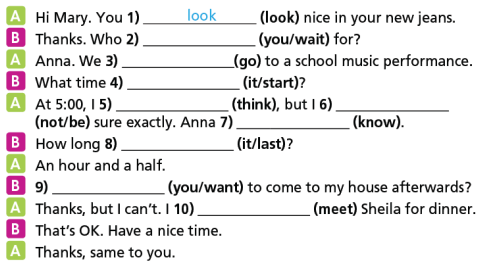
|
Tiêu chí |
Hiện tại đơn (Present Simple Tense) |
Hiện tại tiếp diễn (Present Continuous Tense) |
|
Định nghĩa |
Thì hiện tại đơn dùng để diễn đạt 1 hành động xảy ra thường xuyên, 1 thói quen, lặp đi lặp lại có tính quy luật hoặc 1 sự thật hiển nhiên, 1 hành động diễn ra ở hiện tại. |
Thì hiện tại tiếp diễn biểu đạt 1 hành động đang xảy ra, kéo dài 1 khoảng thời gian ở hiện tại. |
|
Cấu trúc (Động từ thường) |
Khẳng định: S + V(s/es) + O He learns English everyday. (Anh ấy học Tiếng Anh mỗi ngày). |
Không có |
|
Phủ định: S + do/does not + V-inf + O I don’t like to eat fruit. (Tôi không thích ăn các loại hoa quả). |
Không có |
|
|
Nghi vấn: Do/Does + S + V-inf + O? Do you often work late? (Bạn có thường xuyên đi muộn không?) |
Không có |
|
|
Cấu trúc (Động từ tobe) |
Khẳng định S + am/is/are + O I’m a content writer. (Tôi là nhân viên sản xuất nội dung) |
Khẳng định S + am/is/are + V_ing + … I am doing my homework. (Tôi đang làm bài tập về nhà). |
|
Phủ định S + am/is/are not + O He is not a bad guy. (Anh ấy không hề tệ). |
Phủ định S + am/is/are not + V_ing + … She is not cooking lunch. (Cô ấy đang không nấu bữa trưa) |
|
|
Nghi vấn Am/is/are + S + O? Are you ready? (Bạn đã sẵn sàng chưa?) |
Nghi vấn Am/Is/Are + S + V_ing + …? Are you going home? (Bạn có đang về nhà không?) |
*Cách dùng thì hiện tại đơn – hiện tại tiếp diễn
|
Hiện tại đơn (Present Simple Tense) |
Hiện tại tiếp diễn (Present Continuous Tense) |
|
Diễn tả 1 hành động xảy ra thường xuyên, lặp đi lặp lại theo quy luật, thói quen. He learns English everyday at 8 o’clock. (Anh ấy học tiếng anh mỗi ngày lúc 8h). |
Diễn tả hành động đang xảy ra và kéo dài ở hiện tại. I am doing my homework. (Tôi đang làm bài tập về nhà). |
|
Diễn tả 1 sự thật hiển nhiên, chân lý. Water boils at 100 degrees Celsius. (Nước sôi ở nhiệt độ 100 độ C). |
Phàn nàn về 1 hành động nào đó thường xuyên xảy ra. He is always going to work forgetting to bring documents. (Anh ấy luôn quên mang tài liệu khi đi làm). |
|
Diễn tả 1 lịch trình, thời gian biểu, kế hoạch đã biết trước. (Thì hiện tại đơn mang ý nghĩa tương lai) The English lesson starts at 7 o’clock tomorrow morning. (Tiết học Tiếng Anh bắt đầu lúc 7h sáng mai). |
|
*Dấu hiệu nhận biết 2 thì hiện tại đơn và tiếp diễn
|
Hiện tại đơn (Present Simple Tense) |
Hiện tại tiếp diễn (Present Continuous Tense) |
|
Trong câu có các trạng từ chỉ tần suất như: always (luôn luôn) often (thường xuyên) usually (thông thường) sometimes (thỉnh thoảng) every day/ week, month (mỗi ngày/ tuần/ tháng), v.v… |
Trong câu có các trạng từ chỉ thời gian: now (hiện nay, ngay lúc này) at present (hiện tại) at the moment (tại thời điểm này), right now (ngay bây giờ), v.v… các động từ có tính đề nghị, mệnh lệnh như: look, listen, be quiet, v.v… |
*Cách chia động từ V-inf - V(s/es) - V(ing)
|
Chủ ngữ (Đại từ nhân xưng) |
Hiện tại đơn (Present Simple Tense) V tobe / V thường |
Hiện tại tiếp diễn (Present Continuous Tense) |
|
I |
am/ V-inf (nguyên thể) |
am + Ving |
|
You |
are/ V-inf (nguyên thể) |
are + Ving |
|
We, they |
are/ V-inf (nguyên thể) |
are + Ving |
|
He, she,it |
is/ V-s/es (1)* |
is + Ving |
(1)* Cách thêm (s/es) cho động từ đi với chủ ngữ ngôi 3 số ít (he, she, it)
|
Dạng động từ |
Cách chia |
Ví dụ |
|
Kết thúc bằng -o, -s, -z, -ch, -x, -sh, -ss |
Thêm (es) |
choose => chooses pass => passes watch => watches mix => mixes. |
|
Kết thúc bằng một phụ âm + -y |
Đổi (y) => (i) + (es) |
study => studies carry => carries |
|
Kết thúc bằng một nguyên âm + -y |
Giữ nguyên (y) + (s) |
play => plays obey => obeys |
|
Động từ bất quy tắc: Have |
Đổi thành: has |
(2)* Cách thêm (ing) cho động từ ở thì tiếp diễn
|
Dạng động từ |
Cách chia |
Ví dụ |
|
Kết thúc bằng (-e) |
Bỏ (-e) thêm (-ing) |
choose => choosing |
|
Kết thúc bằng một phụ âm (-ie) |
Đổi (-ie) => (y) + (ing) |
lie => lying |
|
Kết thúc bằng 1 nguyên âm + 1 phụ âm và có 1 âm tiết |
Nhân đôi phụ âm cuối và thêm (-ing) |
win => winning cut => cutting |
|
Động từ có nhiều hơn 2 âm tiết & dấu nhấn âm rơi vào âm tiết cuối cùng |
Nhân đôi phụ âm cuối và thêm (-ing) |
permit => permitting (per’mit) |
A: Hi, Mary. You look nice in your new jeans.
(Xin chào Mary. Bạn trông thật đẹp trong chiếc quần jean mới.)
B: Thanks. Who are you waiting for?
(Cảm ơn bạn. Bạn đang chời đợi ai thế?)
A: Anna. We are going to a school music performance.
(Anna. Chúng tôi đang đi tới buổi văn nghệ học đường.)
B: What time does it start?
(Nó bắt đầu lúc mấy giờ?)
A: At 5:00, I think, but I am not sure exactly. Anna knows.
(Lúc 5:00, tôi nghĩ, nhưng tôi không chắc chắn. Anna biết.)
B: How long does it last?
(Nó kéo dài trong bao lâu?)
A: An hour and a half.
(Một giờ và nửa tiếng.)
B: Do you want to come to my house afterwards?
(Bạn có muốn đến nhà tôi ngay sau đó không?)
A: Thanks, but I can’t. I am meeting Sheila for dinner.
(Cảm ơn, nhưng tôi không thể. Tôi có buổi hẹn Sheila để ăn tối.)
B: That’s OK. Have a nice time.
(Vậy là được rồi. Chúc bạn có khoảng thời gian đẹp.)
A: Thanks, same to you.
(Cảm ơn, mong những điều đó cũng đến với bạn.)

Các bài tập cùng chuyên đề
5.Complete the interview with the presentsimple or present continuous form of the verbs.
(Hoàn thành cuộc phỏng vấn với dạng hiện tại đơn hoặc hiện tại tiếp diễn của động từ.)
ANIMAL COMMUNICATION
Dolphin chat
Dr Wenger, what’s your job exactly? What do you do?
I study animal communication.
And what (1) ______________ (you / study) at the moment?
At the moment I (2) ______________ (work) with scientists in Miami. We (3) ______________ (study)
dolphins.
Yes, these photos are interesting. What (4) ______________ (you / do) in this photo?
We (5) ______________ (listen) to the sounds of the dolphins. They usually (6) ______________ (make)
different sounds when they are happy and when they’re sad.
The second photo is great. (7) ______________ (they play)?
Yes, they often(8) ______________ (play). It’s another type of communication.
Very interesting. Thanks, Dr Wenger.
5.Work in groups. Talk about each other following the instructions.
(Làm việc nhóm. Nói về nhau theo hướng dẫn.)
-Take it in turns to toss a coin.
(Lần lượt tung đồng xu.)
-If the coin lands on ‘head’, say a present simple sentence about someone in your class.
(Nếu đồng xu rơi xuống là ‘ngửa’, hãy nói một câu hiện tại đơn về một người nào đó trong lớp của bạn.)
-If the coin lands on ‘tails’, say a present continuous sentence about someone in your class.
(Nếu đồng xu rơi vào "sấp", hãy nói một câu hiện tại tiếp diễn về một người nào đó trong lớp của bạn.)
Maria speaks three languages.
(Maria nói được ba thứ tiếng.)
Lucas is speaking to the teacher.
(Lucas đang nói chuyện với giáo viên.)
LANGUAGE FOCUS Present continuous: questions; Present simple and present continuous
(TRỌNG TÂM NGÔN NGỮ Hiện tại tiếp diễn: câu hỏi; Hiện tại đơn và hiện tại tiếp diễn)
12. Complete the sentences using the present simple or present continuous form of the verbs.
(Hoàn thành các câu sử dụng thì hiện tại đơn hoặc hiện tại tiếp diễn của động từ.)
1 We __________ (not have) homework on Tuesdays.
2 Jo and Clare __________ (do) the exam now.
3 Where’s Ilya? __________ he (listen) to some music in his room?
4 I always __________ (go) to bed at 9∶30.
5 Hoa is on her laptop now. She __________ (not help) with the housework.
6 What time __________ you __________ (start) school every morning?
5. Put the verbs in brackets into the Present Simple or the Present Continous.
(Đặt các động từ trong ngoặc dưới dạng thì Hiện tại đơn hoặc thì Hiện tại tiếp diễn.)
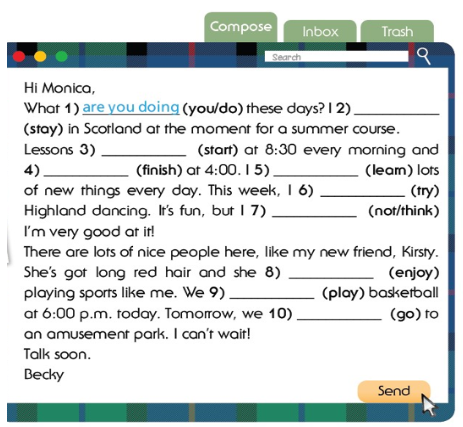
5. Put the verbs in bracket into the Present Simple or the Present Continuous.
(Đặt các động từ trong ngoặc vào thì Hiện tại đơn hoặc Hiện tại tiếp diễn.)
On weekdays, Jeremy 1) ______ (wake) up at 7:00 a.m. He 2) ______ (get) dressed and 3) ______ (have) breakfast before going to school. After school, he 4) ______ (do) his homework and then, he 5) ______ (watch) TV. Today is Saturday, Jeremy 6) ______ (not/ go) to school. He and his friends 7) ______ (play) ice hockey. Jeremy 8) ______ (play) ice hockey. He also 9) ______ (train) with his team twice a week. They 10) ______ (play) in the championship next week.
1. Put the verbs in brackets into the Present Simple or the Present Continuous.
(Chia các động từ trong ngoặc ở thì hiện tại đơn hoặc thì hiện tại tiếp diễn.)
1. I walk (walk) to school every day.
2. __________ (you/go) to the clean- up day tomorrow?
3. Jim __________ (build) a birdhouse now.
4. We __________ (not/have) an English lesson on Wednesdays.
5. They __________ (not/do) any environmental projects at the moment.
2. Find two more examples in the text for each rule below.
(Tìm thêm 2 ví dụ trong đoạn văn cho mỗi quy tắc bên dưới.)
|
Grammar |
Present Simple and Present Continuous |
Facts and routines I usually go straight home after school.
Things happening at the moment of speaking It isn’t raining now.
Things happening around now but maybe not at the time of speaking My team is taking part in a tournament this week. |
|
3. Choose the correct option.
(Chọn đáp án đúng.)
1. We study / are studying English this semester. (Chúng tôi đang học Tiếng Anh trong kì này.)
2. Leo saves / is saving his money to buy trainers.
3. Mai wears / is wearing a striped hoodie at the moment.
4. How often do you play / are you playing video games?
5. You don't watch / aren't watching this. Can I change the channel?
4. Make sentences with but to describe Paula's usual life and what she's doing now.
(Tạo câu với từ nhưng để diễn tả cuộc sống thường ngày của Paula và cô ấy đang làm gì.)
Paula usually goes to bed late, but tonight she’s going to bed early.
(Paula thường đi ngủ muộn nhưng hôm nay cô ấy đi ngủ sớm.)
|
Usually |
Now |
|
go to bed late |
tonight / early |
|
drive to work |
today / ride / a bike |
|
not read novels |
a great book at the moment |
|
wear jeans |
today / go / a wedding / so a dress |
|
eat meat |
try to lose weight / so this week / salad |
5. Class survey. Interview your classmates and write their names to complete the sentences.
(Khảo sát lớp học. Phỏng vấn bạn cùng lớp và viết tên họ để hoàn thành các câu sau.)
1. Minh doesn't like dancing.
2. _____always arrives late.
3. _____laughs a lot.
4. _____ is learning to play a musical instrument.
5. _____ is working hard these days.
6. _____ isn't wearing a plain shirt today.
A: Do you like dancing? B: No, I don't.
(A: Bạn có thích nhảy không? B: Tôi không thích.)
4. Complete the text with Present Simple or Present Continuous form of the verbs in brackets.
(Hoàn thành văn bản với các từ theo cấu trúc của thì Hiện tại đơn hoặc thì Hiện tại tiếp diễn vào chỗ trống.)
Subject: Not a good start to the holidays!
Hi Lucy,
How are you? My cousins (1) are visiting (visit) us at the moment. I (2) (like) it very much when they visit us. Ellen is my age, and she (3) (have) the same hobbies as I do. Kirsten is ten, and she (4) (love) music. She (5) (play) music in the living room at the moment. I (6) (sit) in my bedroom now and they're downstairs. Ellen (7) (sing) an old song. I'm sure my parents (8) (enjoy) it a lot because they like to listen to folk music.
How are things with you?
4.Write questions using the present simple or present continuous. Then write answers that are true for you.
(Viết các câu hỏi sử dụng thì hiện tại đơn hoặc thì hiện tại tiếp diễn. Sau đó trả lời các câu hỏi đó có đúng với bạn không.)
what/you/usually do on Saturday morning?
What do you usually do on Saturday morning?
I often go online or I sometimes meet my friends.
1 what/you/do/now?
2 what/your mum/often do at the weekend?
3 where/you/usually do/your homework?
4 what/your best friend/do/at the moment?
5 where /your friends/go/after school every day?
6 where/you/sit/right now?
2. Choose the correct option.
( Chọn câu trả lời phù hợp.)
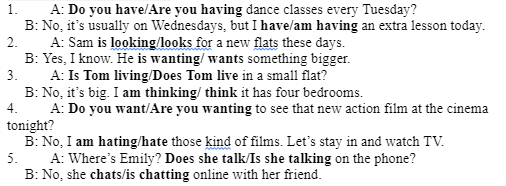
3. Put the verbs in brackets into the Present Simple or the Present Continuous.
( Chuyển các động từ trong ngoặc thành dạng thì Hiên jtaij đơn hoặc thì Hiện tại tiếp diễn.)
1. A: _________________ (Tom/sleep) now?
B: No, he ____________. He ____________(read) a book.
2. A: What _____________ (you/usually/ do) in the afternoon?
B: I ______________ (meet) my friends and we __________ (play) football.
3. A: ________________ (Helen/study) for her maths test at the moment?
B: No, she ______________ (have) a guitar lesson.
4. A: Max ______________ (not like) surfing the Net.
B: I know. He ________ (prefer) watching TV series
4. Put the verbs in brackets into the Present Simple or the Present Continuous.
(Đặt các động từ trong ngoặc ở dạng thì Hiện tại đơn hoặc thì hiện tại tiếp diễn.)
A: Hi, Jane, how 1) _________ (you/be)?
B: Oh, hi Anne. I’m fine. 2) ___________ (you/go) to football practice now?
A: I 3) _________ (not/have) football practice on Sundays. On Saturday afternoons, I usually 4) __________ (hang out) with my friends and 5) ________ (play) computer games. What 6) ____________ (you/do) right now?
B: I 7) ___________ (listen) to music.
A: 8) ____________ (you/want) to go to the park?
B: I can’t. I 9) __________ (go) to the dentist at 4:30.
A: OK then. Call me when you get back. There 10) ___________ (be) a good film on at 8:00. You can come over and watch it with me.
B: OK!
Grammar
5. Put the verbs in brackets into the Present Simple or the Present Continuous.
( Đặt các động từ trong ngoặc thành thì hiện tại đơn hoặc hiện tại tiếp diễn.)
1. The art class ________ at the 9:15 a.m (start)
2. Terry _______ (stay) at his aunt’s house these days.
3. What time ___________ (you/usually/go) to school?
4. Mark __________ (meet) his cousin tomorrow.
5. Mum _________ (watch) TV in the evenings.2. Complete the sentences with the correct present form of the verbs.
(Hoàn thành câu ở dạng hiện tại đúng của các động từ.)
1. I usually have cereal for breakfast. Today, I’m having some toast, too.
(Tôi thường ăn ngũ cốc cho bữa sáng. Hôm nay, tôi cũng có một ít bánh mì nướng.)
2. Tùng doesn’t always come to extra maths classes after school. He __ this week because his marks are getting worse!
3. It always __ when I’m on holiday and look – it’s raining now!
4. I know you play basketball very often. __ this week?
5. My friend __ very near and she walks to school every morning.
6. My brother usually watches game shows, but tonight he __ a soap opera.
3. Match the parts of the sentences.
(Ghép các phần của câu lại.)
1. Cathy doesn’t usually go to bed late
2. She really enjoys soap operas
3. She knows a lot of languages
4. She usually goes on holiday to other countries
5. She sometimes plays the guitar in a band
6. She doesn’t often go out during the week
a. but she hates game shows.
b. but she’s staying in London this week.
c. but she’s watching a film right now and it’s already midnight!
d. but this week she’s playing the drums.
e. but she’s watching a film at the cinema with us right now.
f. but she doesn’t speak Italian.
4. Choose the correct option.
(Chọn ý đúng.)
1. We usually study / are usually studying maths on Mondays, but today we have / ‘re having a test.
2. Linh’s listening to some music, and / but she’s watching TV at the same time! How?
3. I don’t do / ‘m not doing my homework at the moment because my computer doesn’t work / isn’t working.
4. Do you always have / Are you always having a big breakfast before school? No, I don’t / ‘m not.
5. My sister usually wears / is usually wearing jeans and a T-shirt, and / but today she wears / ‘s wearing a smart skirt and jacket.
5. Complete the sentences, using the present simple or present continuous.
(Hoàn thành các câu, sử dụng thì hiện tại đơn hoặc hiện tại tiếp diễn.)
1. Lan always (call) ______ me when I (do) ______ my homework.
2. The workers (put) ______ the solar panels on the hill when it suddenly (rain) ______.
3. While we (look) ______ for information about energy sources, the electricity (go) ______ out.
4. I often (play) ______ the piano in the evening, but tonight I (watch) ______ TV.
5. Normally my father (water) ______the vegetables in the garden, but today he (cook) ______ in the kitchen.
6. They (have) ______ a lot of work to do, so they (not go) ______ to town tonight.
7. He usually (come) ______ back home at one o'clock, but today he (work) ______ late.
6. Put the verbs in brackets into the present simple or present continuous.
(Đặt các động từ trong ngoặc ở hiện tại đơn hoặc hiện tại tiếp diễn.)
My parents work at a big hydro power station. My mother (1. work) ______ in the design section and my father (2. work) ______ in the sales section. He often
(3. go) ______ abroad on business. At the moment, he (4. travel) ______ round America, and next month he (5. meet) ______ a customer in Canada. He (6. like) ______ travelling and (7. enjoy) ______ his present trip, but he always (8. feel) ______ happy to get back home.
Present simple and present continous
5. Complete the email using the correct form of the verbs.
(Hoàn thành email bằng cách sử dụng dạng đúng của động từ.)
Hi Samira!
How are you? I’m having (have) a wonderful time in New York with my family and I (go) to all the famous places here. My dad (enjoy) the trip — it’s his first holiday for a long time!
We (not stay) in a hotel. We (visit) some American friends of my parents called Natalie and Brad. They (live) in a nice apartment near Central Park. Brad (teach) at one of the colleges here and he (walk) to work through the park every day. That’s cooll! Natalie (not go) out to work. She (work) from home — she (use) a small office in the apartment.
What (you / do) now? (you / work) hard for the exams next month?
See you soon,
Alice
Tense revision
1. Choose the correct option.
(Chọn đáp án thích hợp.)
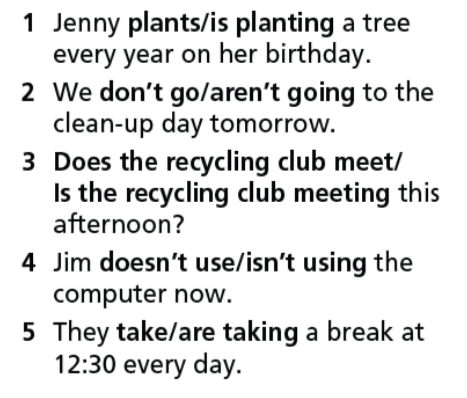
2. Put the verbs in brackets into Present Simple or the Present Continuous.
(Đặt các động từ trong ngoặc thành dạng thì hiện tại đơn hoặc thì hiện tại tiếp diễn.)
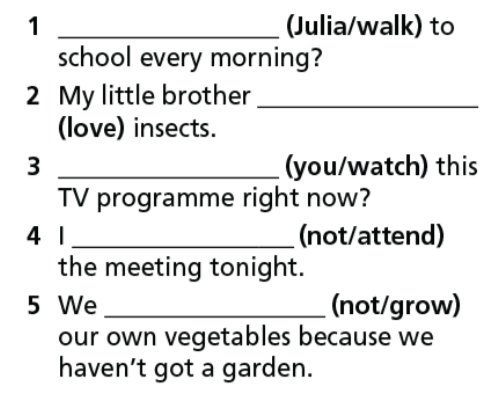
Present Simple/Present Continuous
23. Choose the correct option.
(Chọn đáp án đúng.)
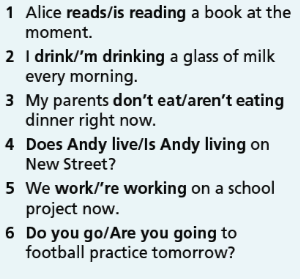
24. Put the verb in brackets into the Present Simple or Present Continuous
(Cho dạng đúng của từ trong ngoặc với thì hiện tại đơn hoặc hiện tại tiếp diễn.)
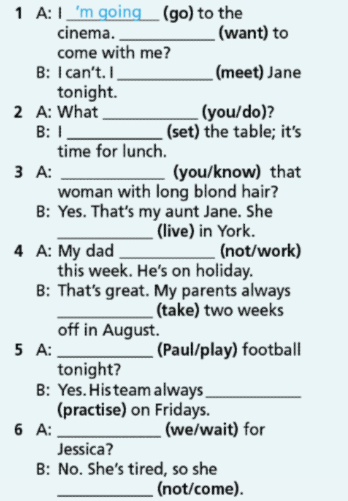
Tense revision.
64. Choose the correct answer.
( Chọn đáp án đúng.)







